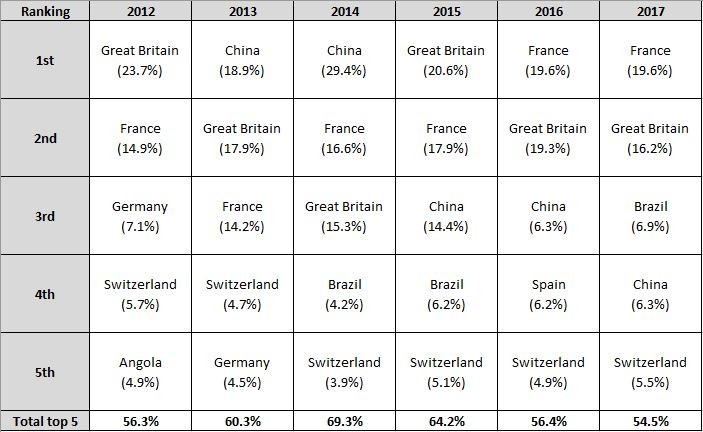
Much has been said about the importance of foreign investment in the current dynamism of the real estate market in Portugal. Now, new data from the National Institute of Statistics (Instituto Nacional de Estatística or INE) officially confirm this trend, showing that in 2017 7.7% of Portuguese properties were sold to non-residents. This is part of a report highlighting "acquisition of Portuguese real estate by non-residents", whose aim is "to increase knowledge of the market for real estate transactions in Portugal.”
Sales of houses to ex-pats corresponded to 11.5% of the total number of transactions in 2017. In 2016, the respective data were 7.3% and 12.5%. The most relevant indicator, however, is the average value of the transactions: houses sold to buyers from abroad cost an average of 160,407 euro, which is almost 50% higher than the national average value of 107,381 euro.
The INE also notes that the total number of property transactions (including urban, rustic and mixed buildings and relating to all uses, in particular housing, commerce, industry, services, etc.), has been growing steadily since 2014. This is good news after the successive decreases from 2006 onwards, reaching peak crisis point in 2008 when the reduction was 14.3%.
On average, since 2014, the increase in the number of properties traded was around 12.5%. In 2017, the number of properties transacted increased by 13.5% compared to the previous year (+14.9% in 2016), and their overall value grew by 33.5% (+20.5% in 2016).
"This growth was mainly due to transactions of urban buildings, which increased by 17.2% in number and 34.1% in value. This means that their average value grew by about 14%, from 119 thousand euro in 2016 to 136 thousand euro in 2017," says the INE, with ex-pats being one of the major drivers of the market in this period.
French buy the most properties in Portugal…
As in the previous year, it was French residents who bought the most houses in Portugal in 2017 (19.6% of the total), as revealed by the INE. From 2012 to 2017, France has always led the ranking for Portuguese property investment, so that in the last six years more than 19,000 properties in Portugal were sold to residents of that country.
"In part, this result is influenced by the acquisition of real estate made by Portuguese emigrants and descendants who settled in that country," says the INE, taking into account that "a similar situation will probably be behind Switzerland being among the top 5 countries of residence of the Portuguese real estate buyer, with a total of 5,200 property transactions between 2012 and 2017.”
…but Brits are in the top five
Taken together, the five main countries of origin of buyers who purchased property in Portugal in 2017 were France, with a 19.6% market share; the UK with 16.2%; Brazil with 6.9%; China with 6.3%; and Switzerland with 5.5%. Overall, they made up 54.5% of the value of sales to non-Portuguese residents last year.

However, in terms of the number of properties sold, the data are slightly different. France still led the way with nearly 5,000 properties (28.3% of the total), and was followed by the United Kingdom with about 2,600 properties bought (14.9% of the total), Switzerland (7.6%), Germany (6.5%) and Belgium (4.7%).
Britain, which topped the list in 2012 and 2015, recorded a total of approximately 12,300 homes purchased by its residents over the six-year period analysed. China headed up the table in 2013 and 2014 and, recording a total of approximately 3,500 properties acquired by its residents.
More than half a million euro per property
In 2017, according to the INE, 6.8% of the properties sold to non-residents had a unit value equal to or greater than 500,000 euro, corresponding to 36.3% of the total value. The number and value of properties acquired by non-residents with a value of less than 500,000 euro has been increasing for the last five years, more than doubling in number and value compared with 2012.
Since 2013, the data show, there has been a trend of growth in the overall value of the properties that changed hands, after a period of successive decreases that occurred from 2008 (-17.6% in that year).
“In 2014 this growth was reinforced, mainly in value, with these properties representing almost half of the total value of all the properties acquired by non-residents that year," points out the INE, recalling that it was in these years that saw the start of the residence permits in Portugal for investment activities (Autorizações de Residência em Portugal para Atividades de Investimento or ARI), more commonly known as Golden Visas.
The Algarve and Lisbon account for more than half of transactions
It was in the Algarve and the Lisbon metropolitan area that the most properties acquired by ex-patriates were found (53.8%). Of the 226,617 properties processed in 2017, 29.7% were in the North, followed by the Central Region (25.6%) and the Lisbon Metropolitan Area (25.1%).
With respect to the volume of transactions, Lisbon accounted for 49.8% of the total, with the North coming in second place (20.3%). The average value of buildings traded in 2017 was significantly higher in Lisbon (212,927 euro) and the Algarve (143,592 euro), with values way above the national average house prices of just 107,381 euro.
The regional distribution of the amount and value of properties bought by non-residents was different. The Algarve led both in number (33.5%) and value (42.8%). This was followed by the Lisbon Metropolitan Area, with 20.3% of the total number of houses transacted and 35.0% of the total monetary value.
Comparing the value of the properties acquired by foreign buyers with the overall value of the transactions carried out in 2017, the Algarve region stands out, with a weight of 40.9%. Next comes the Western region, where 16.4% of total sales in Portugal were made to non-residents.
Non-residential buyers motivate new real estate statistics
The INE has taken this opportunity to explain that they "already disclose information on real estate transactions in the context of the publication of the Housing Price Index”. This is information based on settlement statements for the Municipal Tax on Onerous Transmissions of Real Estate (Impuesto Municipal sobre Transmisiones Onerosas de Inmuebles or IMT), "in which the values disclosed refer only to transactions corresponding to family accommodations, thus restricting real estate for housing".
The information they’re giving now for the 2012-2017 period "has a broader scope, including properties other than those intended for housing", and the data used "come from registers and notaries and are collected by the Portuguese Directorate-General for Justice Policy of the Ministry of Justice (Direção Geral da Política de Justiça do Ministério da Justiça or DGPJ)”.
Real estate in this iteration is classified into three categories – urban, rural and mixed – and the transaction records allow the identification of the buyer's country of residence. "Knowledge of this characteristic is particularly relevant in view of the recent and growing impact of the participation of non-residents in the real estate sector in Portugal," said the INE.